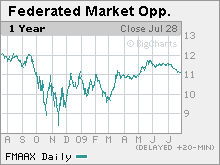A bear who sees no bulls down the road
Mutual fund manager Steve Lehman, who warned of the credit bubble, expects a long recovery.
 |
| Steve Lehman: "Buy and hold is dead at least until the next bull market." |

| MMA | 0.69% |
| $10K MMA | 0.42% |
| 6 month CD | 0.94% |
| 1 yr CD | 1.49% |
| 5 yr CD | 1.93% |
NEW YORK (Fortune) -- On one hand, Federated Investors' Market Opportunity Fund had a good year: In a market where nearly every mutual fund got clobbered, it beat 95% of its competitors in 2008 and topped the S&P 500 by an astounding 30 percentage points.
Led by longtime manager and contrarian Steve Lehman, the fund used smart currency bets and put options on index exchange-traded funds that increase in value when indices fall.
But for Lehman, who believes in absolute returns (gains in any market), there was little to celebrate: The Market Opportunity Fund fell by 7%. "We still lost money," he said in a recent interview from his Pittsburgh office. "It was a disappointment."
The $1.5 billion fund is off to a hot start in 2009, up 6% year to date as Lehman and partner Dana Meissner focus on gold, agriculture, and energy stocks. As a global multi-asset allocation fund, its holdings can shift between nearly any asset class -- U.S. and international stock markets, currencies, commodities, and cash.
In years past Lehman was labeled a perma-bear by market watchers, and earned the moniker "House bear" from colleagues. But his early admonishments of the credit bubble and historically outsized corporate profits have proved prescient. "I've positioned the portfolio for what I think will be a very difficult bottom here in the U.S. market and I'm waiting," he told a reporter in September 2006.
What does he see now for U.S. stocks? A long recovery. "Buy and hold is dead at least until the next bull market," he says. After U.S. consumers and business racked up record debt levels, Lehman expects stocks to underperform for years. He says the S&P 500 (SPX) is greatly overvalued and points to the fact that the average stock in the index traded at 1.6 times book value at the end of June, well above previous recession levels of below 1. He expects the index to bottom out near 500 (it's now at 970.)
"We are in a secular bear market, Lehman says, and "stocks tend to have 15-20 year cycles." He expects a U.S. recovery to follow a similar pattern to the Japanese market from 1989 to 2003. During that period it had three major rallies with gains of 40% apiece. "But over the entire period, the decline was 70%. If you buy and hold you're going to come out behind."
And he warns against buying into a U.S. recovery and consumer discretionary stocks, which led the markets' spring rally. "We're short on restaurants and retailers, because the U.S. consumer is tapped out," he says.
Lehman thinks retailers in particular are troubled. "A number of retailers have very large lease obligations that they're on the hook for years to come -- that's on top of their reported debt. It's a very cluttered business. Ideally you want to [invest in] areas where there hasn't been capacity increases, which was true in commodities."
The fund's biggest holdings as of June 30 include Yamana Gold (AUY), a Canadian gold miner; PowerShares DB Agriculture Fund (DBA), which follows a Deutsche Bank commodities index; and Kinross Gold (KGC), another Canadian gold miner. The rest of the top ten reported equity holdings are energy drillers, gold miners, and agricultural equipment manufacturers. More than half the fund's assets are in cash equivalents as Lehman waits for new opportunities.
Down the road, he sees an opportunity in gold stocks. Lehman has cut back his gold-related holdings to 12% of the fund because prices rose too much in the last rally to make gold attractive, but he's waiting to buy more and long-term, he's very bullish. He notes that the gold market is relatively small, and it would only take a slight increase in China's gold reserves -- which he points out are nearly nonexistent -- or those of institutional investors for a strong increase.
"It would take a very small shift in allocation preferences in favor of gold to have a huge increase in demand relative to the supply of gold," he says. Lehman won't say if he sees China increasing its reserves, but he says,"We're positioned for a higher price of gold down the road."
So what's a retail investor to do? Lehman's answer: Leave it to the pros. "It's never been more difficult [to invest]," he says, "and it will remain more challenging than ever. Unless someone really has a flare for investing and enjoys doing it, I would say don't waste your time." ![]()
-
 The retail giant tops the Fortune 500 for the second year in a row. Who else made the list? More
The retail giant tops the Fortune 500 for the second year in a row. Who else made the list? More -
 This group of companies is all about social networking to connect with their customers. More
This group of companies is all about social networking to connect with their customers. More -
 The fight over the cholesterol medication is keeping a generic version from hitting the market. More
The fight over the cholesterol medication is keeping a generic version from hitting the market. More -
 Bin Laden may be dead, but the terrorist group he led doesn't need his money. More
Bin Laden may be dead, but the terrorist group he led doesn't need his money. More -
 U.S. real estate might be a mess, but in other parts of the world, home prices are jumping. More
U.S. real estate might be a mess, but in other parts of the world, home prices are jumping. More -
 Libya's output is a fraction of global production, but it's crucial to the nation's economy. More
Libya's output is a fraction of global production, but it's crucial to the nation's economy. More -
 Once rates start to rise, things could get ugly fast for our neighbors to the north. More
Once rates start to rise, things could get ugly fast for our neighbors to the north. More








